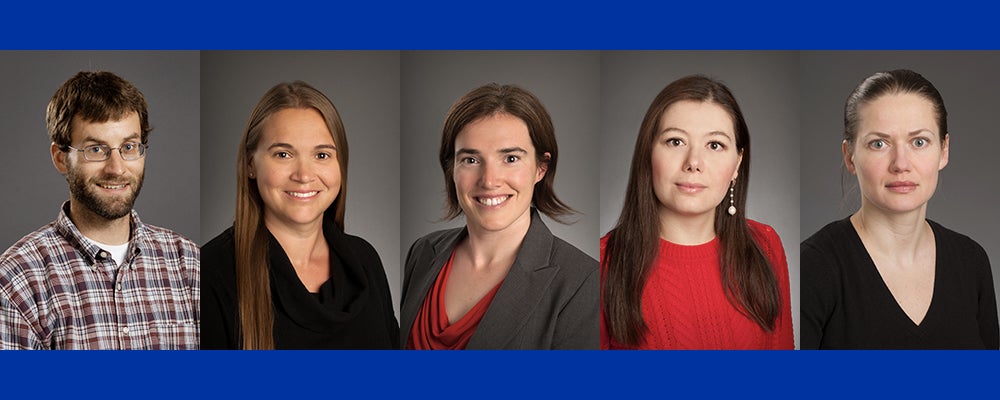
Five trailblazing, early-career faculty in the Boise State College of Engineering have been awarded National Science Foundation (NSF) CAREER awards totaling more than $2.5 million to conduct research on pressing issues.
Not only has Boise State earned the highest number of NSF CAREER awards in Idaho in 2020, but as of April 21, has also done so across 12 peer and aspirational institutions, and matched award numbers of national research institutions such as Stanford University and the Massachusetts Institute of Technology.
“This is an incredible achievement for our faculty and for Boise State University,” said Dr. Marlene Tromp, Boise State president. “Not only does research foster service to our community, but it also helps our students to become innovative leaders and thinkers. We are committed to continuing to grow our research efforts, and identifying new ways to leverage them to benefit our state, our region and the world.”
CAREER awards are the National Science Foundation’s most prestigious early-career awards. They are distinct in that selected faculty must serve as academic role models in research and education and present integrated research and educational plans. These often include innovative hands-on educational opportunities for both Boise State students as well as regional schools, institutions, and organizations.
Boise State CAREER awardees of 2020 are as follows:
- Clare Fitzpatrick, an assistant professor in the Department of Mechanical and Biomedical Engineering. Fitzpatrick’s study will work to develop a holistic understanding of the factors that contribute to osteoarthritis onset and progression. This widespread degenerative condition impacts more than one third of the population over age 65. Knowledge resulting from this study will enable personalized osteoarthritis risk predictions and assist clinicians in developing custom treatment plans to best prevent or slow the disease on a patient-specific basis.
- Mike Hurley, an assistant professor in the Micron School of Materials Science and Engineering. Hurley’s research seeks to understand the underlying mechanisms of corrosion, or rust, on metal alloys. State-of-the-art characterization instruments at Boise State will be used to study how metals rust in liquids, at the nanometer scale. By understanding the complex interplay between a material and its environment, the research will help develop new methods to predict and assess corrosion, and guidelines for engineers to design new materials with novel properties that are more reliable.
- Catherine Olschanowsky, an assistant professor in the Department of Computer Science. Supercomputing drives advances in many areas of science and engineering. Resources of this class cost tens of millions to set up and operate, so the scientific applications using them should produce the largest scientific advancement possible, in the shortest amount of time, using the least amount of energy. However, scientific applications operate inefficiently in that they typically perform operations at less than 30 percent of the potential maximum rate. Olschanowsky’s project seeks to overcome key obstacles to automated code optimization for scientific applications.
- Elena Sherman, an assistant professor in the Department of Computer Science. Sherman’s research seeks to find novel techniques to improve software verification, which is integral to keep computer software secure, reliable and safe. To do this, the project will focus on program invariants, which are the summaries of possible program behaviors, an essential part of software verification.
- Francesca Spezzano, an assistant professor in the Department of Computer Science. Spezzano’s research significantly reduces the destructive spread of misinformation on social media and other Web sources, and its potential threat to national security, by developing new machine learning algorithms to better detect authenticity and recommend content.
“The College of Engineering is always pleased to celebrate the extraordinary accomplishments of our faculty, especially our early-career faculty,” said College of Engineering Dean JoAnn Lighty. “The highly competitive NSF CAREER grant is one of those recognitions that we are proud of, especially with having a record five faculty obtain this prestigious honor this year!”
Of the approximately 80 tenure/tenure-track faculty in the College of Engineering, there are currently 11 NSF CAREER awardees as well as several others who have won early-career awards from other federal agencies. Faculty in tenure-track equivalent positions and in non-tenure-track positions with substantial research and educational responsibilities are also eligible.